Trio Levinson at the Embassy of Hungary
October 18, 2006
___________________________________________________________________
The Washington Post, 10/18/06: The uprising of Oct. 23, 1956, was one of the most tragic days in Hungarian history -- some 2,500 people lost their lives. But it was also one of Hungary's most glorious days: The revolt against Soviet oppression was, in the words of Hungarian Ambassador Andras Simonyi, "the first crack in the wall" that eventually led to the freedom of Eastern Europe.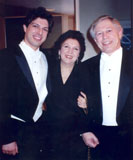 To commemorate the event's 50th anniversary, the Embassy of Hungary hosted a concert Monday night by Trio Levinson, a Russian-born family who fled the Soviet Union via Hungary some 30 years ago. It's an intriguing idea: Rather than Hungarians, ask Russian musicians to explore the heroism and tragedy of this epochmaking event, with its roots in the universal human yearning for freedom.
To commemorate the event's 50th anniversary, the Embassy of Hungary hosted a concert Monday night by Trio Levinson, a Russian-born family who fled the Soviet Union via Hungary some 30 years ago. It's an intriguing idea: Rather than Hungarians, ask Russian musicians to explore the heroism and tragedy of this epochmaking event, with its roots in the universal human yearning for freedom.
But the promise went largely unfulfilled. The links between the music and the uprising seemed tenuous (or even trivial), and with the exception of Bela Bartok's "Romanian Folk Dances," there was no actual Hungarian music to be heard -- and little that seemed weighty enough to mark the occasion.
That said, the playing was fine enough. While the Bartok sounded a bit touch-and-go, Gary Levinson demonstrated his considerable command of the violin in Edvard Grieg's heroic Sonata No. 3 in C Minor, Op. 45. His playing is purposeful, almost to a fault; one wished he'd loosen his determined grip on the phrasing and let the music breathe a bit more, though he may have been compensating for the rather tentative piano accompaniment by his mother, Gina. But his performance of Maurice Ravel's Gypsy-inspired "Tzigane" was superb -- detailed, colorful and wildly, perfectly extravagant.
With their odd instrumentation of violin, piano and double bass, the trio teamed up only once for the evening, in Sergei Rachmaninoff's lyrical "Trio Elegiaque" No. 1 in G Minor. Eugene Levinson, Gary's father, played the cello part on the bass, and while technically it worked, the bass doesn't have the singing tone of the cello, and the result just sounded distorted -- like a cello with a head cold. But on the whole, the concert -- part of the estimable Embassy Series -- did not disappoint.
Opera week at our house
September 29, 2006
__________________________________________________________
This has been opera week at our house, apparently -- we took in the Washington National Opera's current offerings of Bartok's "Duke Bluebeard's Castle" and Puccini's "Gianni Schicchi" on Monday, and the new production of Nicholas Maw's "Sophie's Choice" on Wednesday.
A lot to love in the first two, but I'm sad to say that "Sophie" was a major disappointment. I'd been really looking forward to it; my preview of it in the Post last week had focused on whether the extensive nip and tuck on the original production would tighten up its various sags.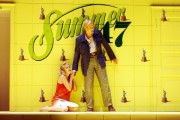 Unfortunately, it didn't. It's shorter, sure. And the music's engaging, the singing is powerful, the acting is fine. But the story has been transplanted clumsily to the stage, and in more than three hours it never got up much steam. The wrenching, implacable buildup of tension in Styron's novel (and Alan Pakula's 1982 film adaptation) was nowhere to be found, Sophie's own fascinating moral contradictions were diluted into a bland porridge of victimization, and the punch-in-the-gut climax felt more like a gentle pat. The
Unfortunately, it didn't. It's shorter, sure. And the music's engaging, the singing is powerful, the acting is fine. But the story has been transplanted clumsily to the stage, and in more than three hours it never got up much steam. The wrenching, implacable buildup of tension in Styron's novel (and Alan Pakula's 1982 film adaptation) was nowhere to be found, Sophie's own fascinating moral contradictions were diluted into a bland porridge of victimization, and the punch-in-the-gut climax felt more like a gentle pat. The hideously ugly rather unattractive set didn't help matters, either; virtually all the action takes place outside of what looks like a gas station restroom, complete with yellow eezy-klene tiles and a banner that, for three hours, helpfully reminded us slow thinkers what year we were in.
Maw has been widely praised for writing his own libretto for this opera -- but it looks like that was really his undoing. He essentially just stitched together sections of Styron's dialogue, with no hard thinking about how to make it work onstage -- and that's exactly how it came across. Note to would-be dramaturges: Dramatic writing is a whole lot harder than it looks.
Kudos anyway to Maw for a fine score, and to Angelika Kirchschlager, the brilliant mezzo who plays Sophie, and to conductor Marin Alsop, who (in her WNO debut) realized Maw's score with exceptional clarity and intelligence. (For a more articulate and complete assessment, see Tim Page's review of the premiere.)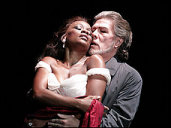 "Duke Bluebeard's Castle," which we saw on Monday, was a dark and beautiful gem, completely riveting despite the breathtakingly static action, in which two characters barely traverse the set.
"Duke Bluebeard's Castle," which we saw on Monday, was a dark and beautiful gem, completely riveting despite the breathtakingly static action, in which two characters barely traverse the set.
Baritone Samuel Ramey and mezzo Denyce Graves were stunning, as you'd expect from such majesties, and William Friedkin's staging was imaginative, vivid, and altogether satisfying. I had only heard a recording of this work, which never really grabbed me and has been gathering dust. But this production was ear-opening, and it may be time to revisit that sadly-ignored disk.
The other work on Monday's program was Giacomo Puccini's "Gianni Schicchi," a one-act romp that was the frothy dessert to the heavy meat of "Bluebeard." The cast was pleasant if unremarkable, but there were seriously nifty performances by Ramey (returning to perform the title role with crazy-like-a-fox wit) and the gifted young soprano Amanda Squitieri, who turned in a very pretty account of the opera's show-stopping aria, "O mio babbino caro," that won her a prolonged ovation.
Pink Martini shakes it up; Sophie gets her debut
September 23, 2006
__________________________________________________________
The Post's chief critic Tim Page reviewed Thursday's American debut of Nicholas Maw's opera "Sophie's Choice" today; he loved the music but thought the production still too long -- even after the extensive cuts.
"There remains the big, pragmatic, essential question -- does it work ?" he writes. "And here we break out the waffles, as my own answer, after one encounter, must be a qualified "sort of." I suspect that the score is even better than it sounded, melding consonance and chromaticism in a way that is lyrical, luminous and generally easy on the ear while remaining intellectually interesting throughout.
"And yet "Sophie's Choice," even after the considerable trimming it received following the premiere performances, remains a long evening in the theater -- almost 3 1/2 hours with one intermission. I don't know exactly what I would cut -- virtually nothing is shoddy or second-rate -- but something should go."
________________________________________________________________________
Christina Couch has an intriguing piece in the Christian Science Monitor on The Ambitious Orchestra, the Los Angeles-based daKAH Hip-Hop Orchestra, the Everyone Orchestra, and The Vienna Vegetable Orchestra -- groups that are all trying to find ways to get new listeners into classical concert halls.

Photo by Jason Bean
"Part symphony, part rock mega-ensemble, The Ambitious Orchestra (TAO) is the first and perhaps the only symphonic group in the world devoted exclusively to 'bringing the virtuosity back to rock and roll'," writes Couch. "Churning out original tunes covering the usual (and not-so-usual) hot topics of the genre, the 20-piece classically-trained ensemble - which includes string, wind, horn, and percussion sections - draws a mix of teen groupies, 20-something hipsters and their concerto-loving parents."
But it's the Vienna Vegetable Orchestra that really catches the attention. "After hearing everything from traditional African pieces to experimental electronic music played on instruments such as the "radish-marimba" and the "cucumberophone," the audience is treated to a hearty soup made from the vegetable scraps that didn't make it into the orchestra itself," says Couch.
_____________________________________________________
We had an absolute blast at Pink Martini's concert on Thursday night -- and so did everybody else, to judge by the roars of love that greeted every song. My only complaint is that China Forbes didn't sing "Lily" -- but they did play almost every other gem from "Sympathique" and "Hang on Little Tomato", plus a few pieces from their next album, still in the works but scheduled for February. Here's my review:
The Washington Post 9/23/06:
Does America need a Pink Martini?
Yes, please -- and right away, to judge from the wildly enthusiastic crowd at George Washington University's Lisner Auditorium on Thursday night. This 12-piece band from Oregon has been a major hit in Europe with its genre-busting mix of styles ranging from Brazilian sambas and Japanese film music to torch songs from the 1930s. Its two self-produced albums have sold more than a million copies around the world.
And at the sold-out Lisner show, where the band ended a rare North American tour, Pink Martini showed why it may be turning into the next big thing here, too.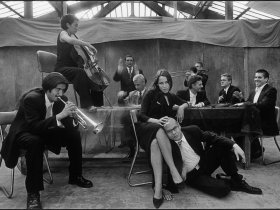 Opening with a smoldering, lounge-music version of Maurice Ravel's "Bolero," the band launched into a wild, two-hour ride through several decades and a dozen languages and styles -- a sort of "urban musical travelogue," as pianist Thomas Lauderdale puts it -- that was pure electricity from beginning to end.
Opening with a smoldering, lounge-music version of Maurice Ravel's "Bolero," the band launched into a wild, two-hour ride through several decades and a dozen languages and styles -- a sort of "urban musical travelogue," as pianist Thomas Lauderdale puts it -- that was pure electricity from beginning to end.
Lauderdale and singer China Forbes call themselves "musical archaeologists," digging up neglected treasures and styles from the past and reinventing them for the 21st century. But there's nothing pedantic about the result: This is rich, hugely approachable music, utterly cosmopolitan yet utterly unpretentious. And it seems to speak to just about everybody: The Lisner audience included everyone from grade-schoolers to grandmothers to the young and hip and beautiful.
Forbes delivered elegant accounts of more than a dozen of the band's favorites, including "Let's Never Stop Falling in Love" (which, like much of Pink Martini's music, she co-wrote with Lauderdale) and the swooning, heartfelt "Amado Mio," as well as new pieces like the 1934 song "Tempo Perdido," from the band's upcoming album -- tentatively scheduled for release in February.
Forbes has a fine, velvety voice, and though she may not yet have the richness and dramatic power of a great cabaret singer, she made up for it Thursday with style, sliding from sultry ballads into whispery Japanese melodies without a trace of effort. Throughout, she radiated a kind of femme-fatale-in-training charm -- the girl next door who's not quite sure how she ended up onstage but is going to make like a vamp anyway.
For all the sophistication of the music, there was an agreeably homespun atmosphere to Pink Martini's stage show. Pianist Lauderdale (as chic as could be in a short-sleeve shirt, bow tie and platinum-dyed hair) played with his back to the audience and only rarely displayed his virtuosity, giving the spotlight to the other band members -- with spectacular results. Cellist Pansy Chang's solo in the dark Croatian song "U Plavu Zoru" was pure dark honey, moody and evocative, while Gavin Bondy on trumpet, Robert Taylor on trombone and Dan Faehnle on guitar kept things storming through hard-driving tunes like "¿Donde Estas, Yolanda?" and "Una Notte a Napoli."
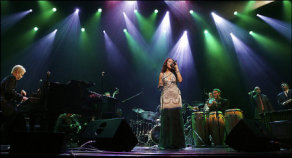
By James Wilderhancock
Lauderdale and Forbes believe the diversity of the band's members is at the heart of Pink Martini's musical eclecticism.
"It's really a result of the number of people in the band, who all come from different backgrounds, from classical to jazz to Brazilian to Cuban," Forbes said in a phone conversation from Cleveland last week, where the band was performing at the Museum of Art.
Both she and Lauderdale grew up in multicultural families -- she's partly African American, while Lauderdale (who calls himself a "mystery Asian") is one of four racially diverse adopted children.
"I grew up playing classical, and China's more folk-rock-pop," Lauderdale said. "And because everybody in the band has a voice and everybody writes music, it translates to quite a diverse repertoire."
Pink Martini got its start in 1994, when Lauderdale put a band together in Portland, Ore., to play at fundraisers for progressive causes. He invited Forbes to join him (the two had become friends while undergraduates at Harvard), and they began writing songs and released their first album, "Sympathique," in 1997. They weren't expecting much to happen ("we released it in a sort of 'Portland' way," said Forbes, laughing), but the lilting title song was picked up by Citroen for a commercial and became a huge hit in France -- launching the band's European career.
The extensive travel put them in the role of cultural diplomats, Lauderdale said.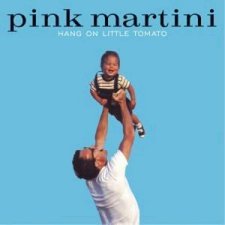
2004's "Hang On Little Tomato""American pop culture sends a very particular image of what American culture is," he said. "I think the band represents a larger, more diverse America, so it's more authentic in that way."
Pink Martini's real mission, he said, is to deepen American pop music by exploring the past.
"One of the sad things about modern American culture is that there's not much awareness of history on the part of the younger generation," he said. "There's sort of a cultural and social and historical amnesia."
Lauderdale thinks that, in music, he's found an essential ingredient for surviving the 21st century.
"There's such optimism in the music from the past!" he said. "And if we're writing music in that style, the challenge is to find that true optimism -- despite everything that we've learned and everything that we know."
Sophie's Choice, Zorn's MacArthur
September 20, 2006
________________________________________
Nikki Kahn - The Washington PostNicholas Maw's opera "Sophie's Choice" gets its American debut tomorrow night at the Kennedy Center, with Marin Alsop conducting and the wild anti-diva Angelika Kirschlager in the title role. It's been substantially shortened and tightened up from the messy 2002 premiere at Covent Garden -- but will it fly? We shall see ...
I have a longish backgrounder on it in today's Post:
The Washington Post 9/20/06: "Sophie's Choice," William Styron's searing 1979 novel, is nothing if not operatic. The tale of Auschwitz survivor Sophie Zawistowska's attempt to build a new life in America is almost unbearably tragic, careening through a nightmare of passion, madness, cruelty and death, until it reveals the devastating act of brutality at its core.
Operatic, definitely. But is it opera? Or, more precisely, is the sprawling, troubled opera that British composer Nicholas Maw unleashed on the world four years ago finally ready for prime time? (read whole article ... )
______________________________________________ Great news yesterday that the relentlessly inventive and frighteningly creative saxophonist/composer John Zorn has been named a MacArthur Fellow. Zorn's been one of the most influential figures on the New York improvisation and new music scene for decades, and shows no signs of slowing down. His Tzadik label is producing some of the most bleeding-edge music around (new releases by Anthony Coleman, Billy Martin and Evan Parker are out this month), and he also started The Stone, an East Village performance space dedicated to new music.
Great news yesterday that the relentlessly inventive and frighteningly creative saxophonist/composer John Zorn has been named a MacArthur Fellow. Zorn's been one of the most influential figures on the New York improvisation and new music scene for decades, and shows no signs of slowing down. His Tzadik label is producing some of the most bleeding-edge music around (new releases by Anthony Coleman, Billy Martin and Evan Parker are out this month), and he also started The Stone, an East Village performance space dedicated to new music.
_____________________________________
Came across the band Matmos the other day -- two guys who incorporate a warehouse of field sounds (laser eye surgery? latex fetish clothing?) into their dry and ironic music.  From their website: "In their recordings and live performances over the last nine years, Matmos have used the sounds of: amplified crayfish nerve tissue, the pages of bibles turning, a bowed five string banjo, slowed down whistles and kisses, water hitting copper plates, the runout groove of a vinyl record, a $5.00 electric guitar, liposuction surgery, cameras and VCRs, chin implant surgery, contact microphones on human hair, violins, rat cages, tanks of helium, violas, human skulls, cellos, peck horns, tubas, cards shuffling, field recordings of conversations in hot tubs, frequency response tests for defective hearing aids, a steel guitar recorded in a sewer, electrical interference generated by laser eye surgery, whoopee cushions and balloons, latex fetish clothing, rhinestones on a dinner plate, Polish trains, insects, ukelele, aspirin tablets hitting a drum kit from across the room, dogs barking, people reading aloud, life support systems and inflatable blankets, records chosen by the roll of dice, an acupuncture point detector conducting electrical current through human skin, rock salt crunching underfoot, solid gold coins spinning on bars of solid silver, the sound of a frozen stream thawing in the sun, a five gallon bucket of oatmeal."
From their website: "In their recordings and live performances over the last nine years, Matmos have used the sounds of: amplified crayfish nerve tissue, the pages of bibles turning, a bowed five string banjo, slowed down whistles and kisses, water hitting copper plates, the runout groove of a vinyl record, a $5.00 electric guitar, liposuction surgery, cameras and VCRs, chin implant surgery, contact microphones on human hair, violins, rat cages, tanks of helium, violas, human skulls, cellos, peck horns, tubas, cards shuffling, field recordings of conversations in hot tubs, frequency response tests for defective hearing aids, a steel guitar recorded in a sewer, electrical interference generated by laser eye surgery, whoopee cushions and balloons, latex fetish clothing, rhinestones on a dinner plate, Polish trains, insects, ukelele, aspirin tablets hitting a drum kit from across the room, dogs barking, people reading aloud, life support systems and inflatable blankets, records chosen by the roll of dice, an acupuncture point detector conducting electrical current through human skin, rock salt crunching underfoot, solid gold coins spinning on bars of solid silver, the sound of a frozen stream thawing in the sun, a five gallon bucket of oatmeal."
Ok, why not. Have a listen to "Lipostudio," which straddles hilarity and nausea. And, you can dance to it!
Improvisers invade Baltimore -- Pink Martinis all around!
September 16, 2006
_______________________________________________________________
Oh, that's right -- I have a blog. Knew there was something. Sorry about the long delay -- all passengers receive a complimentary Glenn Gould De-Vocalizer.
Interesting week -- chats with Marin Alsop and composer Nicholas Maw at rehearsals for Maw's opera "Sophie's Choice", which is getting its American premiere on Thursday at the Kennedy Center -- a new production that promises to be tighter and brighter than the Covent Garden production in 2002. 
Thomas LauderdaleAlso spent an afternoon on the phone with smart, funny "musical archeologists" Thomas Lauderdale and China Forbes, who are bringing their supercool band Pink Martini to Lisner Auditorium on Thursday night. Lauderdale's a classically-trained pianist with a fervent musical curiosity, and the band's been a huge success overseas -- especially in France, where their song "Sympathique" has earned a place of honor in the national pop culture.
Should be a wild concert --"somewhere between a 1930s Cuban dance orchestra, a classical chamber music ensemble, a Brasilian marching street band and Japanese film noir" -- but may be sold out; check with Lisner.
____________________________________________________________
Drove up to Baltimore ("Edge of the Known Universe") on Thursday for the High Zero Experimental and Improvised Music Festival, which is now in its eighth -- eighth! -- year, making it almost an ivy-covered institution. Some spectacular performances and moments of great beauty and passion, interspersed -- inevitably -- with other moments of great noodling and fluff. But what's life without risk? And one of the performances -- by the young Japanese artist Fuyuki Yamakawa, who controlled the pace of his own amplified heartbeat as a percussive base to his multiphonic throat-singing -- was one of the most astounding things I've ever heard.
But what's life without risk? And one of the performances -- by the young Japanese artist Fuyuki Yamakawa, who controlled the pace of his own amplified heartbeat as a percussive base to his multiphonic throat-singing -- was one of the most astounding things I've ever heard.
Baltimore's carved out a real place for itself in the international improvising community, thanks to the interesting minds behind the Red Room Collective, which puts on weekly performances of experimental music. The High Zero Festival is a good place to get started with this music, and it continues tonight and Sunday -- well worth checking out if you can.
The Post had to cut my review for length -- it's a cruel world -- but here's a fuller take on Thursday night's performance:
The Washington Post 9/16/06: Could there possibly be a better place for a festival of cutting-edge, improvised music than Baltimore? It’s long been a breeding ground for experimental artists – this is the home of the American Visionary Art Museum, after all – and there’s an anything-goes energy to the arts scene there that just puts Washington to shame.
So it’s not surprising that when the High Zero Festival – four days of wildly adventurous and completely extemporaneous music – opened its eighth season on Thursday night at Baltimore’s Theater Project, the packed house heard some of the most intense new music being made anywhere – on everything from oboes and one-of-a-kind instruments to the human body itself.
Fuyuki Yamakawa
And there were some unforgettable performances. The pale and wraithlike Fuyuki Yamakawa opened the evening in total darkness, his heart beating loudly through microphones taped to his chest. With intense concentration and control, he slowed his heartbeat and sped it up again, altering the dynamics and rhythms into a disturbing percussive background, then began a dark incantation over it using an amplified Central Asian throat singing technique.
As a few bare light bulbs – synced to the beating of his heart -- pulsed like a ritual fire, the effect was powerful and deeply strange, like a shamanistic ritual from the 23rd Century. And at the climax, when Yamakawa drew his breath in and completely stopped his heart in sudden, horrifying silence, the impact was devastating – as if we’d all just stepped off a cliff.
By comparison, the rest of the evening – half-hour improvisations from combinations of more than a dozen musicians -- seemed nearly conventional. But it showcased some of the most creative figures in the new music community, including instrument builder Cooper-Moore, who performed on one of his own inventions – a sort of mouth-held, attenuated violin that he both bowed and sung into -- with a wonderfully evocative, meta-human sound.
Cooper-Moore teamed up with the ferocious British percussionist Roger Turner, Japanese guitarist Uchihashi Kazuhisa and Baltimorean Michael Formanek on bass, for a virtuosic, take-no-prisoners set. Despite a breathless density at times (there were moments that sounded like everything Iannis Xenakis ever wrote being played at the same time) this was smart, satisfying playing – a whirlwind of imaginative instrumental color and texture, played with brains and considerable wit.
Baltimore saxophonist Rose Hammer was equally impressive in a radically different improvisation, with Stewart Motofsky and Dave Smolen on electronics, and Leonel Kaplan on trumpet. The quartet painted a subtle, introspective landscape that was almost dreamlike in its delicacy, yet always focused and always engaging.
Not all of the sets came off quite as well; vocalist Lexie Macchi was disappointingly tentative in her improvisation, and her set (with oboist Kyle Bruckmann, Michael Muniak on electronics and Forbes Graham on trumpet) idled in neutral for twenty minutes before giving up the ghost. On balance, though, it was an impressive evening, and the festival continues through Sunday night -- with many of Thursday’s performers appearing again in new combinations. Adventurous ears, take note.
Beach's birthday; Kirchner on composing
September 5, 2006
_______________________________________________________
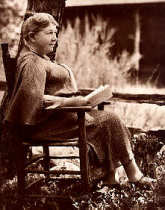
The redoubtable Amy BeachToday's the 139th birthday of Amy Marcy Cheney Beach, America's first significant American female composer. Born in New Hampshire, Beach was a true prodigy; even as a young child she knew that "no other life than that of a musician could ever have been possible for me." But it wasn't easy -- she had to compose over the opposition of her family and husband, and the more general sexism of the times.
She's best remembered for her songs, her "Gaelic" Symphony in E minor, Op. 32 and her Concerto in C sharp minor, Op. 45, which she performed extensively in Europe after her husband died. Her music's well in the romantic tradition, and I'm not sure it's aged all that well. But her role in music history is assured, and she has many admirers; here's Leopold Stokowski's congratulatory note to her about the "Gaelic", which he had just performed.
____________________________________________
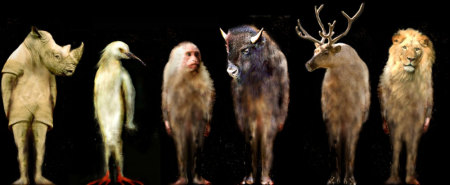 British director and set designer Julian Crouch (who's responsible for the imaginative set of "Jerry Springer: The Opera") has some sketches online for a production of The Magic Flute. A few intriguing images; take a look.
British director and set designer Julian Crouch (who's responsible for the imaginative set of "Jerry Springer: The Opera") has some sketches online for a production of The Magic Flute. A few intriguing images; take a look.
____________________________________________________________
Lauren PipernoPulitzer-winning composer Leon Kirchner on the wisdom that comes with age (he's 87), in an interview the other day with The Bend Weekly.
"Who am I talking to? I'm certainly writing for an audience," says Kirchner (who's been described as "the great romantic composer of the late 20th Century").
"For a time, 12-tone composers, who were also electronic composers, found that they could control music totally, and that it would be for them and their computer.
"I never felt that way, and I don't think they feel that way now, either. When they begin to age, they begin to hunger for the applause, and the notoriety."
Ah yes -- the roar of the crowd, and the smell of the notoriety.
New music in Amsterdam, exploding pianos, and The Maltese Tenor
September 3, 2006
_______________________________________________________________ The venerable Gaudeamus Foundation is launching its annual International Music Week today in Amsterdam, with performances of new works from young composers that will run through the 10th. It's a competition; twenty new works by composers under thirty have been nominated, and the winner gets the Gaudeamus Prize -- a $5,000 commission for a new ensemble work, which will be performed at next year's festival.
The venerable Gaudeamus Foundation is launching its annual International Music Week today in Amsterdam, with performances of new works from young composers that will run through the 10th. It's a competition; twenty new works by composers under thirty have been nominated, and the winner gets the Gaudeamus Prize -- a $5,000 commission for a new ensemble work, which will be performed at next year's festival.
__________________________________________________________

The graphic artist and ceramicist Judith Schils made a series of 18 enigmatic, explosive studies of a piano a couple of years ago; they're online now, and well worth having a look at.
______________________________________________________ In DC this week: In honor of Malta National Day (which actually seems to be on September 8, but never mind) the Embassy Series is putting on a "pre-season concert" with Maltese tenor Juan Gambina on Wednesday at the Meridien House International. A little Mozart, a little Puccini, a little Gounod ... you get the idea.
In DC this week: In honor of Malta National Day (which actually seems to be on September 8, but never mind) the Embassy Series is putting on a "pre-season concert" with Maltese tenor Juan Gambina on Wednesday at the Meridien House International. A little Mozart, a little Puccini, a little Gounod ... you get the idea.

